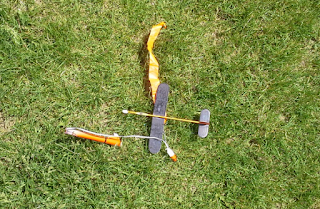The week following Memorial Day has been marked by
increasingly mild weather conditions along the Colorado front range. Close watch of local wind and weather
forecasts revealed that today would be an ideal day to get in a little rocket
flying., so I took a break from the endless yard work, packed up some rockets
and gear, and headed out to Dove Valley Park.
Arriving around 10:45 a.m., the first bird to be prepped and
launched was the old Hornet. The model
turned in yet another great flight on an A3-4T engine.
I was a bit concerned about attempting to launch this bird
on a 1/4A engine with a 3 second delay, but I opted to proceed anyway. My trepidation was confirmed at launch when
the bird ascended straight up to a little over 100 feet, turned over, and
headed straight down. It pranged just
when the ejection charge went off.
Much to my surprise, the glider survived the impact
intact. The power pod suffered only
minor bending at the fore end of the body tube.
An easy fix that will have the Mini Maggot ready to fly another day.
I think the glider can handle a 1/2A engine
which can be had with a 2 second delay.
One bright spot of this flight was the great performance of the newly
constructed glider rod and gantry system.
Since I had some spare ¼ A engines in the range box, out came
the little Mosquito for a quick flight or two.
The first launch boosted the model straight and high, and,
as expected with Mosquito flights, it disappeared after ejection. Surprisingly, I spotted the model on the turf
right away about 40’ distance from the launch pad. No extended searching this time.
I quickly had the model ready to go for a second
flight. Nice thing about Mosquitos is
the quick prep time.
Again, #105 boosted nicely.
By this time a bright, high altitude cloud had appeared overhead, so I
didn’t even see the delay and ejection smoke.
I had to rely solely on the direction of the ejection sound to get an
idea of where to start looking for the model.
This time, finding the rocket was not so easy. After a full
20 minutes of methodically searching the vicinity around the launch area, I had
no Mosquito. I did manage to find a lot
of other orange things:
An orange drinking straw,
An orange candy wrapper,
An orange foam ear plug,
Even a piece of actual orange peel!
But no (BRIGHT) orange rocket.
Vexed and perplexed, I almost gave up , but decided to make
one more circuit of the field, this time expanding the search radius by another
100 feet.
That’s when I finally found the bird…a full soccer field
length’s distance from the launch pad. It was remarkable that it had traveled
that far on a ¼ A engine!
On the long trek back to the launch area, I found this….
Doubtless left on the field after a kid’s soccer match.
“WINNER’” says the plastic medallion.
Was this a congratulatory message to me for having found the
Mosquito, or is it instead a cruel mockery of the 25 minutes spent searching?
Nevertheless, I am happy to have the Mosquito back after its
6th flight. The ‘WINNER’
award will be proudly draped around the model’s display stand back at the
workshop!
The final flight of the day was turned in by the Estes Lynx
on an A10-3T engine. This model has
always proven to be a great performer, and today’s launch was no
exception.
Ignition and boost were
perfect, but at ejection I saw no deployed parachute. The model fell fairly quickly, but in a
horizontal position with the ‘chute and shock cord tangled around the wings and
fins. The Lynx survived this little
mishap without a scratch.
With that done, it was time to pack up and leave DV park to
the sole possession of a gentleman who was out scanning the fields with a metal
detector….









